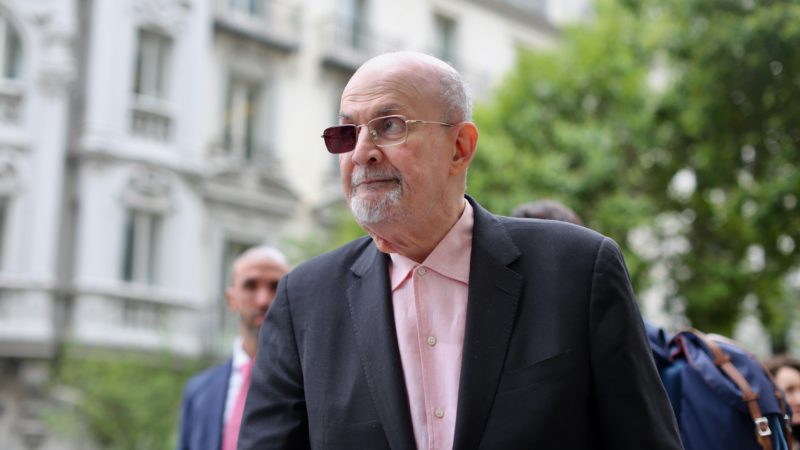Salman Rushdie wrote about his attempted murder. Now he will face his attacker in court
A trial has begun for the man accused of violently stabbing Salman Rushdie onstage at a literary event in 2022, which left the British author permanently blind in one eye.
Lawyers for Rushdie and the alleged attacker, Hadi Matar, delivered opening statements inside the Chautauqua County Courthouse in Mayville, N.Y. on Monday.
Matar, a 27-year-old from Fairview, N.J., has pleaded not guilty to charges of attempted murder and assault.
The trial was postponed last year to give Matar’s public defender time to read Rushdie’s memoir Knife: Meditations After an Attempted Murder, about the violent attack and his road to recovery.

In August of 2022, Rushdie was poised to speak at the Chautauqua Institution in western New York when a man ran to the stage and repeatedly stabbed the author. In addition to blinding an eye, knife attack left Rushdie with almost no feeling in two fingers on his left hand.
Matar was soon arrested. Two years later, federal authorities accused Matar of engaging with Hezbollah, an Iran-backed militant group in Lebanon, which is designated as a terrorist organization by the U.S.
A separate, federal indictment alleges that Matar provided “material support and resources” to Hezbollah starting in September 2020, in an attempt to carry out a fatwa on Rushdie calling for his assassination, issued by Iran’s supreme leader Ayatollah Khomeini in 1989.
The fatwa was spurred by the release of Rushdie’s 1988 novel, The Satanic Verses, which the Ayatollah saw as blasphemous in its portrayal of Islam and the Prophet Muhammad.
Rushdie spent much of his life in hiding as a result. After the Ayatollah died in 1998, the Iranian government stepped back from the fatwa, saying it would “neither support nor hinder assassination operations on Rushdie.”
According to the indictment, Matar was partly motivated by a 2006 speech from Hezbollah Secretary General Hassan Nasrallah endorsing the fatwa.
The terrorism-related federal charges are separate from the murder and assault charges. Both trials are ongoing. Matar could face life in prison for the terrorism offenses alone, according to the U.S. Attorney’s Office in the Western District of New York.
Last year, Rushdie released Knife, in which he detailed his near-death experience and the toll it took on him physically and mentally. In an interview with NPR’s Fresh Air about the book, Rushdie recalled the moment of the attack.
“I confess, I had sometimes imagined my assassin rising up in some public forum or other and coming for me in just this way. So my first thought when I saw this murderous shape rushing towards me was, so it’s you. Here you are,” he said last April.
“This was my second thought. Why now? Really? It’s been so long. Why now after all these years?” He added.
Taiwan’s president pledges to defend island’s sovereignty after Chinese military drills
Taiwanese President Lai Ching-te vowed to defend the self-ruled island's sovereignty in the face of what he termed China's "expansionist ambitions," days after Beijing wrapped up live-fire military drills near its shores.
Deaths reported during widening protests in Iran sparked by ailing economy
The protests began due to economic pressures, with Iran's currency rapidly depreciating. Demonstrators have also chanted against the country's theocracy.
Congress failed to extend Obamacare subsidies. This Democrat says Trump can save them
Sen. Peter Welch, D-Vt., says he thinks the Senate can pass a "retroactive" Affordable Care Act subsidy extension, but "we need President Trump."
Rideshare union rights, social media limits and other state laws taking effect Jan. 1
Every new year, public media reporters across the country bring us some of the new state laws taking effect where they are. Here are six in 2026.
Guides to help you tackle your New Year’s resolutions
From building your strength to tackling credit card debt, NPR's Life Kit has a newsletter journey to help you tackle your New Year's resolution.
Guides to help you tackle your New Year’s resolutions
From building your strength to tackling credit card debt, NPR's Life Kit has a newsletter journey to help you tackle your New Year's resolution.






